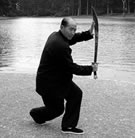Taijiquan Broadsword Form
"The single edged, curved bladed dao, or saber, dates from around the
13th -14th centuries. The curved blade was introduced to China as a
result of the Mongol invasions, and its popularity is shown by the fact
that it had eclipsed the straight bladed jian as the dominant military
side arm from the 15th century onward. The "willow leaf" (liu ye) dao is
an old blade pattern which displays considerable variety in shape and
dimensions. Generally averaging about 26 -30 inches in length, its blade
curves gently throughout its entire length. The blade may remain almost
the same width for its whole length, or it may gradually taper towards
the point. It often had a sharpened back edge, indicating a higher
degree of sophistication in its technical usage. A military issue
weapon, its blade shape, size, types of fittings and ornamentation were
regulated by documented imperial specifications. Each blade size was
intended for a specific military application. For example, a relatively
short dao might be used by vanguard troops scaling walls on climbing
ladders, where a long, difficult to draw sword would be awkward to put
into use. The willow leaf saber was almost completely eclipsed by the
"oxtail" blade pattern made for civilian use by the mid 19th century."
- David F. Dolbear, Introduction to Antique Chinese Swords of the Qing Dynasty Period
The following webpages include links, bibliographies, lists of movements, techniques, history, quotations, and resources.
Broadsword: All Styles
Chen Taijiquan Broadsword
Yang Taijiquan Broadsword
Cloud Hands Taijiquan
I practice the Chen Taijiquan 23 Movement Broadsword Form. Here is a list of the 23 movements of the Chen Broadsword form.


No comments:
Post a Comment